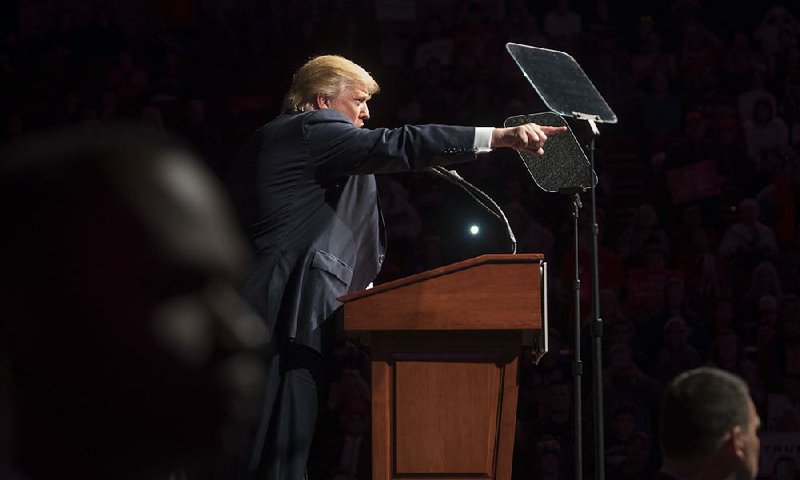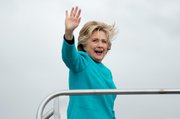PORTSMOUTH, N.H. -- Donald Trump sought to undermine the legitimacy of the U.S. presidential election Saturday, pressing claims that the contest is rigged against him, vowing anew to jail Democratic nominee Hillary Clinton if he's elected, and throwing in an insinuation that Clinton was on drugs during the last debate.
RELATED ARTICLES
http://www.arkansas…">Met with rising hostility, Trump-rally reporters say http://www.arkansas…">WikiLeaks releases more records
"The election is being rigged by corrupt media pushing completely false allegations and outright lies in an effort to elect her president," he said, referring to the several women who have stepped forward in recent days to say that Trump had groped or sexually assaulted them. He has denied the claims, calling the women liars, even as another woman stepped forward Saturday with allegations against him.
Earlier Saturday, Trump took to Twitter to warn that "100% fabricated and made-up charges, pushed strongly by the media and the Clinton Campaign, may poison the minds of the American Voter. FIX!"
"Hillary Clinton should have been prosecuted and should be in jail," he said. "Instead she is running for president in what looks like a rigged election."
[INTERACTIVE: The 2016 election in Arkansas]
Trump has repeatedly claimed, without offering evidence, that election fraud is a serious problem and encouraged his supporters to "go and watch" polling places in certain areas to make sure things are "on the up and up."
Trump also suggested Saturday that Clinton was on drugs during the presidential debate last Sunday, and he challenged his rival to take a drug test before the final debate Wednesday in Las Vegas.
"Athletes, they make them take a drug test. I think we should take a drug test prior to the debate. I do. I think we should, why don't we do that? We should take a drug test prior, because I don't know what's going on with her. But at the beginning of her last debate she was all pumped up at the beginning and at the end she was like, 'Oh, take me down.'"
"And she could barely even reach her car," he said at the end, appearing to refer to when Clinton's knees buckled as she was escorted into her vehicle after leaving a Sept. 11 ceremony in New York City. She had pneumonia at the time.
Instead of spending the weekend preparing, he said, "I think she's actually getting pumped up, you want to know the truth."
Trump offered no evidence to support the claim. Nothing about Clinton's demeanor in the debate suggested that she was under the influence.
Trump's comments about the previous debate echoed allegations that his longtime ally Roger Stone made last week during an interview with "InfoWars," a conservative media platform known to circulate conspiracy theories.
Clinton stepped away from the campaign trail over the weekend to prepare for the third debate, which is Wednesday. Trump has spent the week criticizing his opponent's public schedule as too heavy on "debate prep" while he campaigns around the country.
When asked for comment about Trump's remarks, the Clinton campaign directed reporters to a statement by Robby Mook, the campaign manager, that was put out earlier in the day in response to Trump's allegations of a "rigged" election.
"Campaigns should be hard fought and elections hard won, but what is fundamental about the American electoral system is that it is free, fair and open to the people," Mook wrote. "Participation in the system -- and particularly voting -- should be encouraged, not dismissed or undermined because a candidate is afraid he's going to lose."
House Speaker Paul Ryan, whose decision not to campaign for Trump angered the GOP nominee, made clear that he does not share the candidate's concern about the election's legitimacy.
"Our democracy relies on confidence in election results, and the speaker is fully confident the states will carry out this election with integrity," said his spokesman AshLee Strong.
It was not the first time Trump has raised the idea that the election is unfairly tilted against him, but it has become a theme for the New York businessman in the past several days as he's slipped in preference polls and faces allegations of sexual misconduct.
Another accuser
On Saturday, another woman stepped forward and alleged that nearly two decades ago Trump made unwanted advances toward her.
"He took my hand and grabbed me and went for the lips," Cathy Heller, now 63, told the Guardian newspaper.
The encounter, Heller said, occurred at a Mother's Day brunch at Trump's Mar-a-Lago estate in Florida. Trump was greeting brunch attendees, she said.
"He said, 'Oh, come on.' He was strong. And he grabbed me and went for my mouth and went for my lips," she recalled.
A spokesman for Trump denied the allegations.
"There is no way that something like this would have happened in a public place on Mother's Day at Mr. Trump's resort. It would have been the talk of Palm Beach for the past two decades," Jason Miller, a spokesman for Trump, said in a statement.
"The reality is this: For the media to wheel out a politically motivated Democratic activist with a legal dispute against this same resort owned by Mr. Trump does a disservice to the public," Miller added.
Heller denied to the Guardian that she has a legal dispute with Trump's resort, but said she is supporting Clinton in the presidential race.
Heller is the ninth woman to step forward in the past week with allegations that Trump groped or forcibly kissed them. He has called all of the allegations false and politically motivated.
Ohio fallout
In Ohio, Trump severed ties with the state's Republican Party chairman Matt Borges, who had become openly critical of the nominee at times. That crack in unity is in a critical battleground state, where Republican Gov. John Kasich, one of Trump's opponents in the primaries, is also not supporting Trump.
Robert Paduchik, Trump's Ohio state director, said in his Saturday letter to members of the GOP's state central committee that Borges, whom he copied in on the note, "does not represent or speak for the candidate and he no longer has any affiliation with the Trump-Pence campaign."
The Columbus Dispatch first reported the letter, which appears under Trump campaign letterhead and was confirmed by Seth Unger, Trump's Ohio spokesman.
Ohio is seen as critical to Trump's chances on Nov. 8. Recent polling shows that Clinton has pulled slightly ahead of Trump in that state.
Trump is struggling to gain traction in key states after The Washington Post reported a 2005 video in which Trump can be heard talking in vulgar terms about forcing himself on women sexually.
Borges did not immediately respond to a request for comment from The Washington Post on Saturday. He told the Post late last month that he had urged Trump to run "a very disciplined, different kind of campaign" in Ohio.
Unger did not immediately respond to a request for an interview with Paduchik. Trump spokesman Miller did not immediately respond to a question about whether Paduchik's letter reflects Trump's opinion on the situation.
As Trump struggles in the polls, his operations in important states have experienced turmoil that campaigns typically strive hard to avoid this late in the race.
Campaign money
As well, campaign money is tight, at least in comparison with his rival's resources, according to information that pre-dates the release of the 2005 video of Trump.
Trump began this month with $75 million in his campaign and joint party accounts, he said Saturday in a statement. That's exactly half of what the Clinton team said it had on hand -- a significant financial disadvantage for the Republican side.
Trump's campaign announced Saturday that he raised $100 million in conjunction with the Republican National Committee last month, up slightly from the $90 million he collected in August.
For her part, Clinton and her joint party fundraising committees raised $154 million in September, ending the month with $150 million in the bank.
Even so, the monthly figure was a record for Trump and provided evidence of his appeal among grass-roots donors. The campaign estimates that 2.6 million people have given to his campaign. It was a small improvement from his fundraising in July and August.
Trump has so far not followed through on promises to spend $100 million of his own fortune on the campaign. In September, he contributed $2 million, his usual amount since he became the Republican nominee.
Trump also said he would blitz Clinton with $100 million in advertising, but he has spent about $32 million, according to two Republican media buyers. They indicated they have reserved substantial additional advertising in swing states.
The Federal Election Commission reports show that the Trump Victory Committee paid Trump's TAG Air Inc. $511,306 over the past three months. That's the holding company for Trump's corporate aircraft. The committee is a partnership between Trump's campaign, the Republican National Committee and numerous state GOP groups.
This is the first FEC filing showing any political committee other than Trump's campaign paying TAG Air. Republican National Committee leaders, including Chairman Reince Priebus and national finance chairman Lew Eisenberg, frequently accompany Trump on fundraising trips.
In all, Trump's campaign has reimbursed TAG Air, Trump properties and other Trump products -- right down to Trump bottled water -- more than $8 million. The candidate stresses that his personal donations more than cover any Trump corporate reimbursements.
Information for this article was contributed by Jill Colvin, Julie Bykowicz and Josh Lederman of The Associated Press; by Jose A. DelReal, Sean Sullivan, Matea Gold and Abby Phillip of The Washington Post; by Nick Corasaniti and Nicholas Confessore of The New York Times; by Mark Niquette of Bloomberg News; and by Kurtis Lee of the Los Angeles Times.
A Section on 10/16/2016

